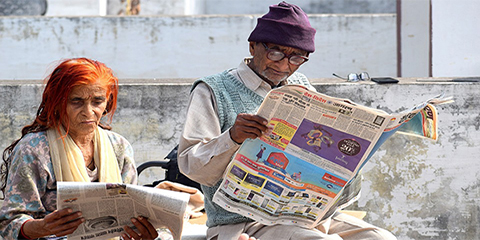How Asian print media is fighting back against digital dominance
JournalismPakistan.com | Published last year | Arjun Malik
Join our WhatsApp channel
MUMBAI—In the bustling cities of Asia, where ancient traditions meet cutting-edge technology, the print media industry is navigating a tumultuous path. From the bustling newsrooms in Mumbai to the traditional print houses in Lahore, the landscape of journalism is shifting dramatically. As digital media continues to grow at an unprecedented rate, print media in Asia is facing a multitude of challenges that threaten its very existence.
One of the most significant challenges is the rise of digital media. With the advent of smartphones and high-speed internet, more people are turning to digital platforms for their news. This shift is not just a matter of convenience; it's also about speed and accessibility. Digital media can deliver news in real-time, a feat that the print media cannot match. As a result, many newspapers and magazines are experiencing a decline in readership.
Financial Struggles
The financial model of print media is also under immense pressure. Advertising revenue, which has traditionally been the lifeblood of newspapers, is rapidly migrating to digital platforms. Companies find online advertising more cost-effective and targeted, leading to a significant drop in print ad revenues. This financial strain forces many publications to downsize their operations, leading to job cuts and a reduction in the quality of journalism.
Content and Credibility
Despite the financial challenges, the print media still holds a significant advantage in terms of credibility. Many readers trust print media more than online sources, which are often plagued by fake news and misinformation. However, maintaining this trust requires substantial investment in investigative journalism and editorial integrity, which is becoming increasingly difficult with shrinking budgets.
Cultural and Linguistic Diversity
Asia's cultural and linguistic diversity presents another unique challenge. Catering to a diverse audience with varying preferences requires a delicate balance. For instance, a newspaper in India must cater to readers in multiple languages, each with its own cultural nuances and expectations. This diversity, while enriching, adds layers of complexity to content creation and distribution.
Adaptation and Innovation
To survive, many print media outlets in Asia are adopting innovative strategies. Some are developing strong online presences to complement their print editions, creating a hybrid model that leverages the strengths of both mediums. Others are investing in niche content that appeals to specific audiences, offering in-depth analysis and high-quality journalism that digital platforms often lack.
The road ahead for print media in Asia is fraught with challenges, but it's not without hope. By embracing digital transformation, diversifying revenue streams, and maintaining journalistic integrity, print media can continue to play a crucial role in informing and educating the public. The resilience and adaptability of the industry will determine its survival in this digital age.
About the author: Arjun Malik is a journalist based in Mumbai and writes on a wide range of topics. He is passionate about the future of journalism and is dedicated to finding innovative solutions to the challenges faced by the print media industry.

























